

Top 10 Highly-Desired Skills You Can Teach Yourself. ‘Free-Range Learners’: Study Opens Window Into How Students Hunt for Educational Content Online - Wired Campus. Milwaukee — Digital natives?
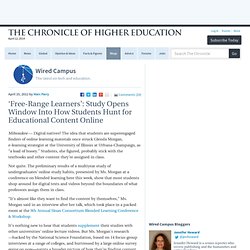
The idea that students are superengaged finders of online learning materials once struck Glenda Morgan, e-learning strategist at the University of Illinois at Urbana-Champaign, as “a load of hooey.” Students, she figured, probably stick with the textbooks and other content they’re assigned in class. Not quite. The preliminary results of a multiyear study of undergraduates’ online study habits, presented by Ms. First Monday. Davidwiley.org. Open access. Research publications that are distributed online, free of cost or other access barriers Open access (OA) is a set of principles and a range of practices through which research outputs are distributed online, free of cost or other access barriers.[1] With open access strictly defined (according to the 2001 definition), or libre open access, barriers to copying or reuse are also reduced or removed by applying an open license for copyright.[1] The main focus of the open access movement is "peer reviewed research literature.
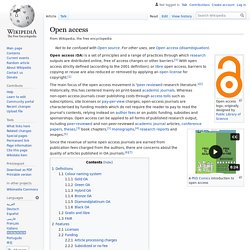
Open-access Publishing & Educational Resources discussion is lively! Susan Edwards, Head Librarian, Education Psychology & Social Welfare Libraries and Margaret Phillips, Librarian at DOE facilitated a lively discussion today regarding Open Access Publishing & Educational Resources and shared with the group many useful links.

Susan and Margaret shared a wonderful online resource for those of us who are interested in learning more about open content, open resources, and open publishing. Visit their Open Educational Resources in Higher Education library site for definitions, resources, copyright information, publishing, etc. Silicon Valley veteran pulls in record-breaking venture capital for Ivy League-caliber online college.
Posted: 05/02/2012 10:35:42 PM PDT0 Comments|Updated: about a year ago Congratulations!
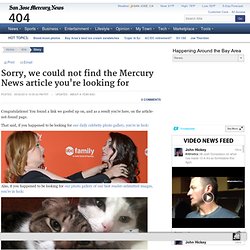
You found a link we goofed up on, and as a result you're here, on the article-not-found page. Go With The Flow. According to Mihaly Csikszentmihalyi, great Web sites are not about navigating content, but staging experience.
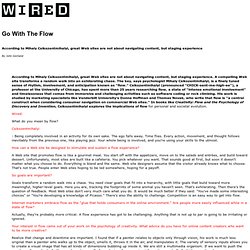
A compelling Web site transforms a random walk into an exhilarating chase. Putting the "Public" In Publicly-Funded Research. Sometimes an idea is so blindingly, obviously good that you have to wonder why it hasn’t already been implemented.
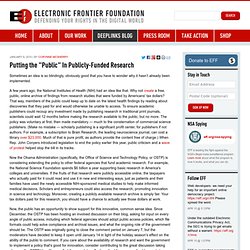
A few years ago, the National Institutes of Health (NIH) had an idea like that. Why not create a free, public, online archive of findings from research studies that were funded by Americans' tax dollars? That way, members of the public could keep up to date on the latest health findings by reading about discoveries that they paid for and would otherwise be unable to access. To ensure academic publishers could recoup any investment made by publishing research in traditional print journals, scientists could wait 12 months before making the research available to the public, but no more. The policy was voluntary at first, then made mandatory — much to the consternation of commercial science publishers. A Disrupted Higher-Ed System - Next. The “disruption” of the higher-ed market is a popular refrain these days.
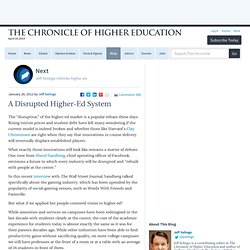
Rising tuition prices and student debt have left many wondering if the current model is indeed broken and whether those like Harvard’s Clay Christensen are right when they say that innovations in course delivery will eventually displace established players. What exactly those innovations will look like remains a matter of debate. One view from Sheryl Sandberg, chief operating officer of Facebook, envisions a future in which every industry will be disrupted and “rebuilt with people at the center.”
Alex Peake's "Code Hero": How To Scale Education The Right Way. In Silicon Valley, one often hears the question, "Does it scale?

" What a technologist means by this is: How can a specific technological innovation be applied in a broad manner to affect a wide range of people? If Google only searched two websites it wouldn't be terribly useful. But because Google scaled effectively to search the entire Internet, it became extremely engaging. Technologists wonder the same thing about education. And projects like the Khan Academy have risen to prominence because they scale--a single video can be watched by millions of people. Often educational experiences don't scale. Considering College During a Recession? Think Again. Culture Teaching Strategies.
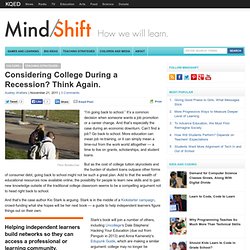
Adult Degree Completion Strategies, 2010 to 2014: Grantee Abstracts – Lumina Foundation. Like Peter Thiel's Fellows, Sebastian Thrun Dropped Out, Hacked Education, Too. Wars have been fought in pursuit of it.
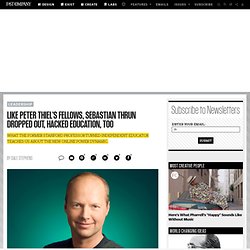
A Boom Time for Education Start-Ups - Technology. By Nick DeSantis Harsh economic realities mean trouble for college leaders. But where administrators perceive an impending crisis, investors increasingly see opportunity. Office of Educational Technology. Change happens big in technology and it happens fast. And when public money is being spent and students’ futures are at stake, it is crucial that changes also happen smart. Our new report, Expanding Evidence Approaches for Learning in a Digital World, calls for smart change by presenting educators, policymakers, and funders with an expanded view of evidence approaches and sources of data that can help them with decision-making about learning resources.
The report describes an iterative R&D process, with rapid design cycles and built-in feedback loops—one familiar in industry but less so in education (however, the report provides numerous examples of applications in education). An iterative R&D process enables early-stage innovations to be rapidly deployed, widely adopted, and—through continuous improvement processes—refined and enhanced over time. What’s On the Horizon in Higher Education. Big Ideas Culture Digital Tools Teaching Strategies. Can Our Great Universities Lead in a Time of Need. Pulitzer Prize winner David Rohde's recent article on our efforts at UNC to turn our university into an engine of innovation argues that America's research universities can make a profound difference in the battle to rebuild the country's economy and its middle class.
With over 250 billion in endowment, research universities are the crown jewels of our society. Rhode's plea that these magnificent institutions do more to generate economic activity while attacking society's biggest problems mirror arguments my co-author Holden Thorp and I make in our book. As Rhode reports, at UNC we are attempting to create a campus culture that focuses on solving important problems and in so doing generate economic activity and new jobs.
Who could be against this? It sounds like motherhood and apple pie. Criticism comes from two directions. Successfully responding to internal criticism of efforts to increase the impact of universities requires a more nuanced approach. Building Good Search Skills: What Students Need to Know. Getty The Internet has made researching subjects deceptively effortless for students — or so it may seem to them at first. Truth is, students who haven’t been taught the skills to conduct good research will invariably come up short. That’s part of the argument made by Wheaton College Professor Alan Jacobs in The Atlantic, who says the ease of search and user interface of fee-based databases have failed to keep up with those of free search engines. Venture Capital in Education: New Technology and New Solutions. At last week’s SXSW interactive conference, blogger Betsy Corcoran of EdSurge convened a panel discussion among venture capitalists on the future of education technology: “ Classroom 2020: VCs and the Education Revolution ”.
Participants included Mitch Kapor of Kapor Capital, Phillip Bronner of Novak Biddle Venture Partners and Rob Hutter of LearnCapital . Education startups are “hot” right now, with stories on TechCrunch , big funding rounds and pop culture attention . But what really matters is not tech hype, but the need: Better solutions for schools, universities and workplace training. At the SXSW panel, the participants set the stage by enumerating the social factors that drive their focus on education: American students’ abysmal performance in science, math and engineering, rising wage inequality and decreasing numbers of jobs available to less-skilled adults.
Youth and Digital Media: From Credibility to Information Quality by Urs Gasser, Sandra Cortesi, Momin Malik, Ashley Lee.